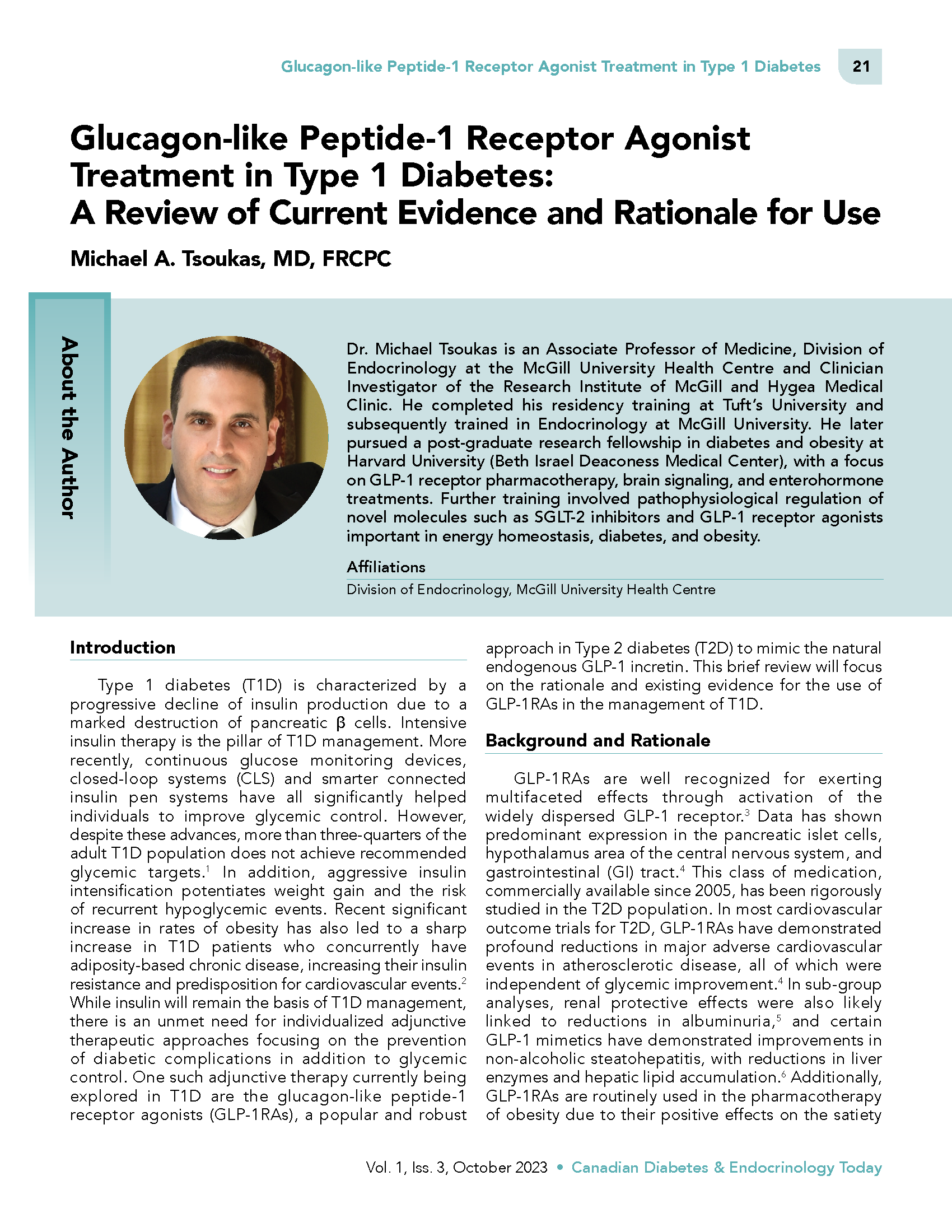Glucagon-like Peptide-1 Receptor Agonist Treatment in Type 1 Diabetes
A Review of Current Evidence and Rationale for Use
DOI:
https://doi.org/10.58931/cdet.2023.1318Abstract
Type 1 diabetes (T1D) is characterized by a progressive decline of insulin production due to a marked destruction of pancreatic B cells. Intensive insulin therapy is the pillar of T1D management. More recently, continuous glucose monitoring devices, closed-loop systems (CLS) and smarter connected insulin pen systems have all significantly helped individuals to improve glycemic control. Despite these advances, however, more than three-quarters of the adult T1D population does not achieve recommended glycemic targets. In addition, aggressive insulin intensification potentiates weight gain and the risk of recurrent hypoglycemic events. Recent significant increase in rates of obesity has also led to a sharp increase in T1D patients who concurrently have adiposity-based chronic disease, increasing their insulin resistance and predisposition for cardiovascular events. While insulin will remain the basis of T1D management, there is an unmet need for individualized adjunctive therapeutic approaches focusing on the prevention of diabetic complications in addition to glycemic control. One such adjunctive therapy currently being explored in T1D are the glucagon-like peptide-1 receptor agonists (GLP-1 RAs), a popular and robust approach in Type 2 diabetes (T2DM) to mimic the natural endogenous GLP-1 incretin. This brief review will focus on the rationale and existing evidence for the use of GLP-1 RAs in the management of T1D.
References
Foster NC, Beck RW, Miller KM, , et al. State of type 1 diabetes management and outcomes from the T1D exchange in 2016–2018. Diabetes Technol Ther. 2019 Jan 18;21(2):66-72. DOI: https://doi.org/10.1089/dia.2018.0384
Vergès B. Cardiovascular disease in type 1 diabetes: A review of epidemiological data and underlying mechanisms. Diabetes Metab. 2020 Nov;46(6):442-449. DOI: https://doi.org/10.1016/j.diabet.2020.09.001
Kobayati A, Haidar A, Tsoukas MA. Glucagon-like peptide-1 receptor agonists as adjunctive treatment for type 1 diabetes: Renewed opportunities through tailored approaches? Diabetes Obes Metab. 2022;24:769-787. DOI: https://doi.org/10.1111/dom.14637
Knudsen LB, Lau J. The discovery and development of liraglutide and semaglutide. Front Endocrinol (Lausanne). 2019 Apr 12;10:155. DOI: https://doi.org/10.3389/fendo.2019.00155
Fellinger P, Fuchs D, Wolf P, et al. Overweight and obesity in type 1 diabetes equal those of the general population. Wien Klin Wochenschr. 2019 Feb;131(3-4):55-60. DOI: https://doi.org/10.1007/s00508-018-1434-9
Ghanim H, Batra M, Green K, et al. Liraglutide treatment in overweight and obese patients with type 1 diabetes: A 26-week randomized controlled trial; mechanisms of weight loss. Diabetes Obes Metab. 2020 Oct 1;22(10):17421752. DOI: https://doi.org/10.1111/dom.14090
Dubé MC, D’Amours M, Weisnagel SJ. Effect of liraglutide on food consumption, appetite sensations and eating behaviours in overweight people with type 1 diabetes. Diabetes Obes Metab. 2020;22(8):1417-1424. DOI: https://doi.org/10.1111/dom.14050
Vilsbøll T, Krarup T, Sonne J, et al. Incretin secretion in relation to meal size and body weight in healthy subjects and people with type 1 and type 2 diabetes mellitus. J Clin Endocrinol Metab. 2003 Jun 1;88(6):2706-2713. DOI: https://doi.org/10.1210/jc.2002-021873
Kielgast U, Holst JJ, Madsbad S. Antidiabetic actions of endogenous and exogenous GLP-1 in type 1 diabetic patients with and without residual β-cell function. Diabetes. 2011 May;60(5):1599-1607. DOI: https://doi.org/10.2337/db10-1790
Drucker DJ. Mechanisms of action and therapeutic application of glucagon-like peptide-1. Cell Metab. 2018 Apr 3;27(4):740-756. DOI: https://doi.org/10.1016/j.cmet.2018.03.001
Bharucha AE, Batey-Schaefer B, Cleary PA, et al. Delayed gastric emptying is associated with early and long-term hyperglycemia in type 1 diabetes mellitus. Gastroenterology. 2015 May 14;149(2):330-339. DOI: https://doi.org/10.1053/j.gastro.2015.05.007
Raman VS, Mason KJ, Rodriguez LM, Hassan K, et al. The role of adjunctive exenatide therapy in pediatric type 1 diabetes. Diabetes Care. 2010 Jun;33(6):1294-1296. DOI: https://doi.org/10.2337/dc09-1959
Jones KL, Huynh LQ, Hatzinikolas S, et al. Exenatide once weekly slows gastric emptying of solids and liquids in healthy, overweight people at steady-state concentrations. Diabetes Obes Metab. 2020;22(5):788-797. DOI: https://doi.org/10.1111/dom.13956
Horowitz M, Rayner CK, Marathe CS, et al. Glucagon-like peptide-1 receptor agonists and the appropriate measurement of gastric emptying. Diabetes Obes Metab. 2020;22(12):2504-2506. DOI: https://doi.org/10.1111/dom.14166
Tsalamandris S, Antonopoulos AS, Oikonomou E, et al. The role of inflammation in diabetes: current concepts and future perspectives. Eur Cardiol. 2019 Apr;14(1):50-59. DOI: https://doi.org/10.15420/ecr.2018.33.1
Polyzos S, Kountouras J, Tsoukas MA. Circulating homocysteine in nonalcoholic fatty liver disease. Eur J Intern Med. 2015 Mar;26(2):152-153. DOI: https://doi.org/10.1016/j.ejim.2015.01.015
Hogan AE, Gaoatswe G, Lynch L, et al. Glucagon-like peptide 1 analogue therapy directly modulates innate immune-mediated inflammation in individuals with type 2 diabetes mellitus. Diabetologia 2014;57(4):781-784. DOI: https://doi.org/10.1007/s00125-013-3145-0
Tardio V, Kellett S, Bidal-St-Aubin M, et al. Effects of incretin therapy and bariatric surgery on inflammation in obese patients. Obes Med. 2019;13:13-20. DOI: https://doi.org/10.1016/j.obmed.2018.12.001
Rother KI, Spain LM, Wesley RA, et al. Effects of exenatide alone and in combination with daclizumab on beta-cell function in long-standing type 1 diabetes. Diabetes Care. 2009 Dec;32(12):2251-2257. DOI: https://doi.org/10.2337/dc09-0773
Johansen NJ, Dejgaard TF, Lund A, et al. Efficacy and safety of meal-time administration of short-acting exenatide for glycaemic control in type 1 diabetes (MAG1C): a randomised, double-blind, placebo-controlled trial. Lancet Diabetes Endocrinol. 2020 Apr 1;8(4):313-324. DOI: https://doi.org/10.1016/S2213-8587(20)30030-9
Dejgaard TF, Frandsen CS, Hansen TS, et al. Efficacy and safety of liraglutide for overweight adult patients with type 1 diabetes and insufficient glycaemic control (Lira-1): a randomised, double-blind, placebo-controlled trial. Lancet Diabetes Endocrinol. 2016 Mar;4(3):221-232. DOI: https://doi.org/10.1016/S2213-8587(15)00436-2
Mathieu C, Zinman B, Hemmingsson JU, et al. Efficacy and safety of liraglutide added to insulin treatment in type 1 diabetes: The ADJUNCT ONE treat-to-target randomized trial. Diabetes Care. 2016 Oct 1;39(10):1702-1710. DOI: https://doi.org/10.2337/dc16-0691
Ahrén B, Hirsch IB, Pieber TR, et al. Efficacy and safety of liraglutide added to capped insulin treatment in subjects with type 1 diabetes. The ADJUNCT TWO randomized trial. Diabetes Care. 2016 Oct 1;39(10):1693-1701. DOI: https://doi.org/10.2337/dc16-0690
Dejgaard TF, Schmidt S, Frandsen CS, et al. Liraglutide reduces hyperglycaemia and body weight in overweight, dysregulated insulin-pump-treated patients with type 1 diabetes: The Lira Pump trial-a randomized, double-blinded, placebo-controlled trial. Diabetes Obes Metab. 2020 Apr;22(4):492-500. DOI: https://doi.org/10.1111/dom.13911

Downloads
Published
How to Cite
Issue
Section
License
Copyright (c) 2023 Canadian Diabetes & Endocrinology Today

This work is licensed under a Creative Commons Attribution-NonCommercial-NoDerivatives 4.0 International License.
